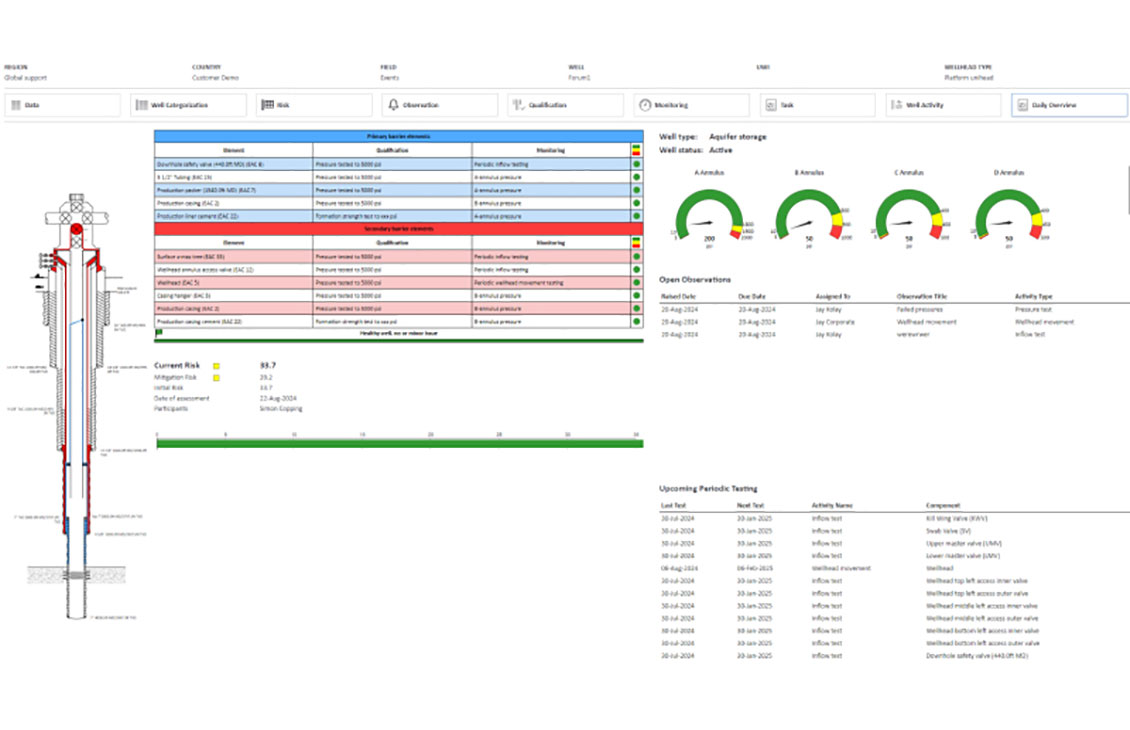Well Integrity Assessment for Carbon Storage
Subsurface software and reservoir simulators enable operators to derisk carbon storage decisions.
Evaluating the economic feasibility and environmental responsibility of carbon storage projects.
Providing a structured framework to proactively manage well integrity

The Wellbarrier well integrity life cycle solution provides operators with a comprehensive, data-based life cycle perspective through its Wellbarrier Planning and Wellbarrier Integrity Management products.
A digital framework for managing well integrity throughout the well life cycle
Using the barrier definition to objectively determine risk
Aligned with industry standards and best practices
Single data repository and intuitive interface enable proactive collaboration
→ Data consolidated and enriched throughout the life cycle of the well.
→ Wellbarrier schematics prepared in minutes rather than hours and ensure stakeholders have a clear and common understanding of the barriers safeguarding the operation.
→ Objectively, systematically, and proactively manage risk and remedial action planning.
→ Qualifying and monitoring well barrier performance to ensure consistent understanding among multidisciplinary teams.
→ Consolidate and analyze data to proactively manage risk and optimize well integrity performance.
Wellbarrier Integrity Management provides the following modules. These are closely aligned with legislative requirements and industry best practices and help provide a robust framework to manage well integrity. The data is then displayed on intuitive dashboards and reported to stakeholders to support collaborative decision making.
Completion diagram and MAASP
Detailed completion diagrams, together with detailed assembly drawings, can be created based upon data entered into the application. The completion diagram aids accurate communication by clearly showing completion component depths, ID, OD, drift diameter, burst and collapse.
The maximum allowable annulus surface pressure (MAASP) calculator is based on the well integrity lifecycle governance calculations defined in ISO 16530-1 and used to determine the greatest pressure that the annulus can contain as measured at the wellhead and without compromising the integrity of any components in the annulus.
Control lines
The enhanced control line visualization shows clear and detailed information such as the depth, number of lines, the type of encapsulation, and the type of line. Any anomalies with the control line are clearly shown on the schematic.
Qualification
Provides a comprehensive overview of the tests that were performed on the well components when they were originally installed.
Monitoring
Monitors the annulus and tubing pressure and temperature. These are the principal parameters used to determine the condition of many of the well components. Results can be compared against acceptance criteria to verify the component integrity. Previous test results are also available for comparison to enable analysis of historic trends. Documents (e.g., test charts) can be uploaded as supporting evidence.
Insights
Show summarized views of data for individual wells and at field, country, or company level. The dashboards are closely aligned with the well integrity standards and best practices. They show show well data, well barriers, well categorization, qualification, risk assessments, monitoring, and usage (the latter for administrators).
Both Wellbarrier Planning and Wellbarrier Integrity Management share the following five Wellbarrier solution features.
Well data and integration
Defines the hole and casing configuration, completion components, reservoir sections, blowout preventer (BOP) configuration, and other well status information.
Engineers can share, track, and update data in real time. Built-in quality assurance continuously improves the data’s richness and accuracy. The Wellbarrier API (Application Programming Interface) allows data to be synchronized between existing systems.
Illustrations
Quickly generate illustrations using intuitive drag-and-drop functionality to represent the well at any stage of its life cycle, enabling the creation of consistent and accurate illustrations in minutes.
Wellbarrier schematic
Shows how the well integrity should be assured through easy-to-read schematics and summary tables of how to qualify and monitor the defined well barrier elements. The well barrier schematic is the foundation of the solution.
Risk assessment
Enables performing of objective failure mode effect and criticality analysis (FMECA) risk assessments for the well or specific operations. Systematic evaluation of failure modes and consequences supports the understanding the risks and specifying mitigating measures to limit them.
Well integrity anomaly tracking
Provides an overview of well integrity anomalies identified during the well’s construction and lifetime. This feature is used to assign actions to colleagues, set deadlines, and take corrective action.
Industry recognized
The Wellbarrier user community comprises more than 6,000 registered users across over 65 countries worldwide. They are using the Wellbarrier solution’s user-friendly and intuitive digital tool to efficiently and effectively prepare more than 110,000 barrier schematics to bring them unique, reliable insight to safeguarding their well integrity.

Contact the SLB team for updates on Wellbarrier training courses.

Holistic well integrity management solution throughout the well life cycle.

Wellbarrier planning support decision-making during planning operations and safeguards the execution of well activities

Wellbarrier integrity management provides a structured framework to proactively manage well integrity.
World leading software built to solve your challenges.
See the latest digital articles, webinars, podcasts, blogs and tech talks.
Access a variety of technical assisted support services and submit support requests online.